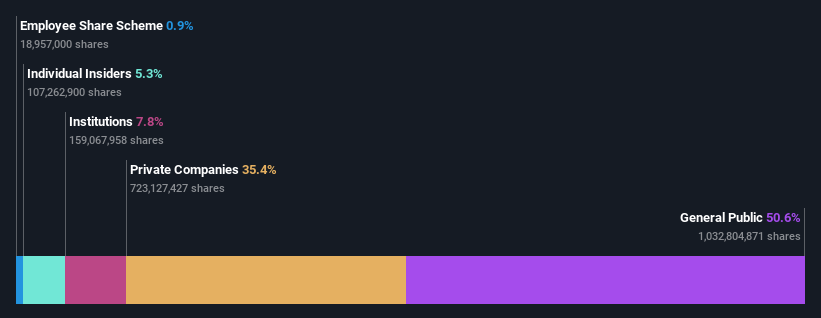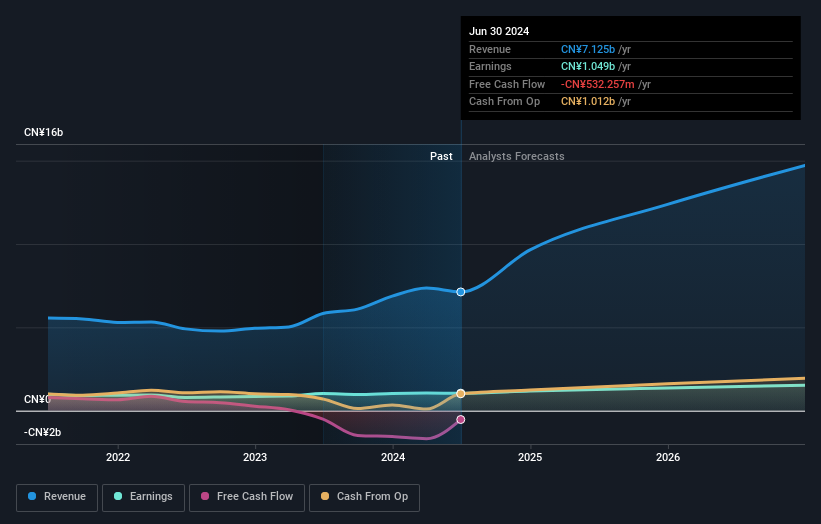- China
- /
- Electrical
- /
- SHSE:601222
Jiangsu Linyang Energy Co., Ltd.'s (SHSE:601222) largest shareholders are retail investors with 51% ownership, private companies own 35%

Key Insights
- Significant control over Jiangsu Linyang Energy by retail investors implies that the general public has more power to influence management and governance-related decisions
- The top 25 shareholders own 49% of the company
- Using data from analyst forecasts alongside ownership research, one can better assess the future performance of a company
Every investor in Jiangsu Linyang Energy Co., Ltd. (SHSE:601222) should be aware of the most powerful shareholder groups. And the group that holds the biggest piece of the pie are retail investors with 51% ownership. Put another way, the group faces the maximum upside potential (or downside risk).
Meanwhile, private companies make up 35% of the company’s shareholders.
Let's delve deeper into each type of owner of Jiangsu Linyang Energy, beginning with the chart below.
Check out our latest analysis for Jiangsu Linyang Energy

What Does The Institutional Ownership Tell Us About Jiangsu Linyang Energy?
Institutional investors commonly compare their own returns to the returns of a commonly followed index. So they generally do consider buying larger companies that are included in the relevant benchmark index.
Jiangsu Linyang Energy already has institutions on the share registry. Indeed, they own a respectable stake in the company. This suggests some credibility amongst professional investors. But we can't rely on that fact alone since institutions make bad investments sometimes, just like everyone does. It is not uncommon to see a big share price drop if two large institutional investors try to sell out of a stock at the same time. So it is worth checking the past earnings trajectory of Jiangsu Linyang Energy, (below). Of course, keep in mind that there are other factors to consider, too.

Hedge funds don't have many shares in Jiangsu Linyang Energy. Looking at our data, we can see that the largest shareholder is Qidong Huahong Electronics Co.,Ltd with 35% of shares outstanding. Meanwhile, the second and third largest shareholders, hold 3.9% and 1.3%, of the shares outstanding, respectively. Yonghua Lu, who is the second-largest shareholder, also happens to hold the title of Chief Executive Officer.
Our studies suggest that the top 25 shareholders collectively control less than half of the company's shares, meaning that the company's shares are widely disseminated and there is no dominant shareholder.
While it makes sense to study institutional ownership data for a company, it also makes sense to study analyst sentiments to know which way the wind is blowing. Quite a few analysts cover the stock, so you could look into forecast growth quite easily.
Insider Ownership Of Jiangsu Linyang Energy
The definition of company insiders can be subjective and does vary between jurisdictions. Our data reflects individual insiders, capturing board members at the very least. The company management answer to the board and the latter should represent the interests of shareholders. Notably, sometimes top-level managers are on the board themselves.
Most consider insider ownership a positive because it can indicate the board is well aligned with other shareholders. However, on some occasions too much power is concentrated within this group.
We can report that insiders do own shares in Jiangsu Linyang Energy Co., Ltd.. It is a pretty big company, so it is generally a positive to see some potentially meaningful alignment. In this case, they own around CN¥736m worth of shares (at current prices). It is good to see this level of investment by insiders. You can check here to see if those insiders have been buying recently.
General Public Ownership
The general public -- including retail investors -- own 51% of Jiangsu Linyang Energy. This level of ownership gives investors from the wider public some power to sway key policy decisions such as board composition, executive compensation, and the dividend payout ratio.
Private Company Ownership
Our data indicates that Private Companies hold 35%, of the company's shares. It's hard to draw any conclusions from this fact alone, so its worth looking into who owns those private companies. Sometimes insiders or other related parties have an interest in shares in a public company through a separate private company.
Next Steps:
It's always worth thinking about the different groups who own shares in a company. But to understand Jiangsu Linyang Energy better, we need to consider many other factors. Consider for instance, the ever-present spectre of investment risk. We've identified 1 warning sign with Jiangsu Linyang Energy , and understanding them should be part of your investment process.
If you would prefer discover what analysts are predicting in terms of future growth, do not miss this free report on analyst forecasts.
NB: Figures in this article are calculated using data from the last twelve months, which refer to the 12-month period ending on the last date of the month the financial statement is dated. This may not be consistent with full year annual report figures.
New: Manage All Your Stock Portfolios in One Place
We've created the ultimate portfolio companion for stock investors, and it's free.
• Connect an unlimited number of Portfolios and see your total in one currency
• Be alerted to new Warning Signs or Risks via email or mobile
• Track the Fair Value of your stocks
Have feedback on this article? Concerned about the content? Get in touch with us directly. Alternatively, email editorial-team (at) simplywallst.com.
This article by Simply Wall St is general in nature. We provide commentary based on historical data and analyst forecasts only using an unbiased methodology and our articles are not intended to be financial advice. It does not constitute a recommendation to buy or sell any stock, and does not take account of your objectives, or your financial situation. We aim to bring you long-term focused analysis driven by fundamental data. Note that our analysis may not factor in the latest price-sensitive company announcements or qualitative material. Simply Wall St has no position in any stocks mentioned.
About SHSE:601222
Jiangsu Linyang Energy
Provides energy meters, and system products and accessories in China and internationally.
Flawless balance sheet average dividend payer.

